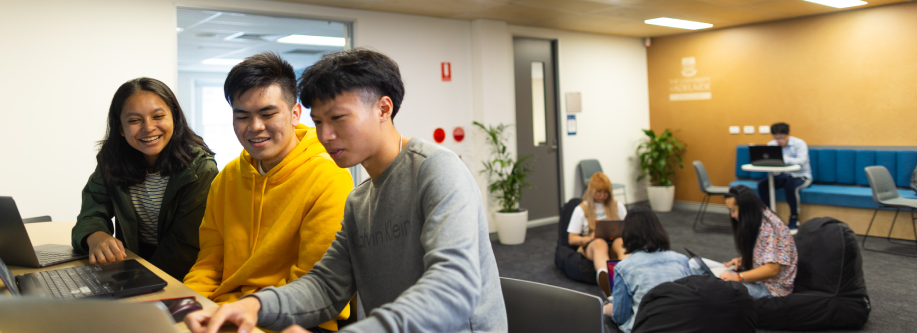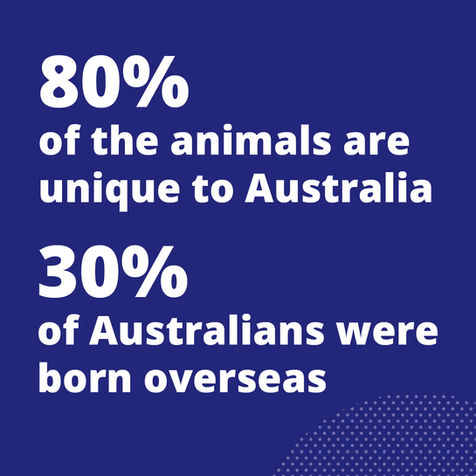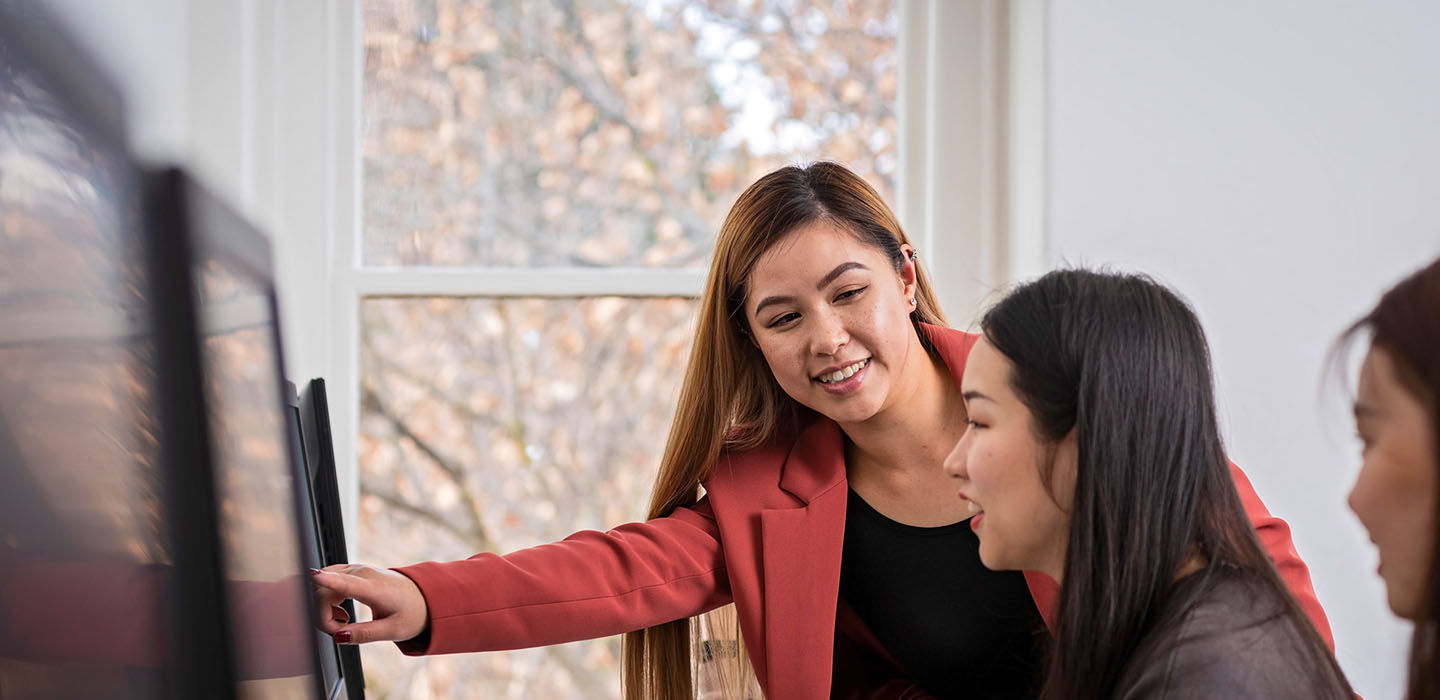
The ultimate student’s guide to living in Australia

Australia has a strong reputation as a rewarding study destination. Australian universities are ranked among the best in the world for quality education, student satisfaction and support. The country is one of the Top 10 most liveable countries in the world* with a high standard of living, a multicultural community, safety, a laid-back lifestyle and vibrant city life. Australia is blessed with natural beauty where you can hike up mountains, trek through rainforests, swim in lakes and under waterfalls or admire harbour views.
Want to learn more? View our full list of blogs in 'Living in Australia'.
We have gathered essential information about living and settling into Australia as a student.

Living in Australia
Australia is a big country – even bigger than Europe - divided into 6 states and 2 territories. Each capital city offers its own unique lifestyle. Before making a decision on which university to enrol in, research what each study location can offer you to see if it suits your needs. For example, if you prefer a busier, metropolitan city with many things to see and do, you may choose Sydney or Melbourne. If you prefer a more relaxed city with less people and larger, green spaces, you may choose Adelaide.
Australian culture
Love of outdoors / relaxed lifestyle
Australia is blessed with sunny weather throughout most of the year which is why Australians love spending time outdoors. You will find many people at the beach, playing sports, gathering at the park, having picnics or enjoying dining outdoors at cafes and restaurants. Australians have a friendly, welcoming and easy-going attitude. They love humour and appreciate people who are honest, genuine and direct.
Multicultural
Australia is a multicultural country with almost a third of the Australian population being born overseas and more than 1 in 5 speaking a language other than English at home. More than half a million students from 192 countries choosing to study in Australia. When you study in Australia, you will be joining a vibrant international student community.
Work / life balance
Even though Australians value their job and career, they still prioritise a healthy work-life balance. They try to only work within their contracted hours to ensure they have enough time for other activities and rest. This is relevant when you begin studying at university. Academic success is important but so is having time for hobbies, exercise, spending time with friends and getting enough sleep which helps you maintain mental wellbeing.
Sports
Australians are passionate about sport. They love watching it and playing it. Popular sports in Australia include cricket, rugby, soccer, surfing and adventure sports such as biking. Each city provides a variety of different sporting facilities and open spaces.
Safety
Australian cities and towns have some of the lowest crime rates in the world. The country’s system of government protects the individual rights of citizens and visitors and the rights and freedoms of everyone, no matter where they come from, are to be respected. Australians place an importance on equality and working together to create a better society.
Aussie slang
The national language in Australia is English, but Australians have their own unique phrases and terms they use to express themselves. Some are more commonly used than others. Often, words are shortened. Below are a few examples of Aussie slang.
Slang
How’s it going?
Arvo
Bikkie
Brekkie
Crook
Defo
Flat out
G’Day
Mozzie
No worries
Prezzie
Relos
Spewin’
Sunnies
Sweet as
Meaning
How are you?
Afternoon
Biscuit
Breakfast
Sick
Definitely
Busy
Hello
Mosquito
All good / no problem
Gift
Relatives
Annoyed/Angry
Sunglasses
Really good
Food and entertainment
Due to Australia’s diverse and multicultural population, you can enjoy a rich variety of food from all around the world. Australia also produces a lot of the fresh fruit, vegetables and meats that are found in the supermarkets. The main supermarket chains are Woolworths, Coles, Aldi and IGA. You will also find many smaller shops selling Australian and international food brands. Australia has a strong coffee culture with a cafe found in every city corner.
There is so much to see and do in Australia for entertainment. Each capital city organises exciting events throughout the year (such as food, cultural, and music festivals) and are home to museums, art galleries, theatres and entertainment venues.
Cost of living and budgeting
The cost of living depends on a lot of factors including the city or town you’re studying in (i.e. city or regional) and your lifestyle choices (e.g. accommodation type, eating out or cooking at home etc). We recommend you use a Cost of Living Calculator to provide an estimate of living costs such as rent, groceries and transportation. Then make a monthly budget to ensure you have enough money to cover your expenses.
Accommodation
Australian cities offer a range of accommodation to suit different needs and budgets. Options include:
-
Short-term accommodation (e.g. hotels, hostels)
-
Renting a house or apartment
-
Managed student accommodation – designed and built for students. They range from private studio apartments to shared rooms and are often close to education providers or near public transport.
-
University-managed accommodation
-
Residential colleges and
-
Homestay
Universities can help you find suitable accommodation particularly university-managed accommodation or residential colleges or you could research online and look at sites such as student accommodation websites or Gumtree. If you have a tight budget, the most affordable option is a shared house or apartment. The further you are away from the city centre, the less expensive the rental fee will be.
Always read the rental agreement (including the fine print) before signing and understand Australia’s rental laws and your rights.

Public transport
Australian cities have a wide public transport network. There are four main options - train, bus, ferry and light rail (also known as trams) and these will vary depending on which city you live in. In most of the major cities, you will need to buy a pre-paid card for travel on public transport. For example, in Melbourne, you need to buy a myki card, and in Sydney, an Opal Card. Cycling is also a popular and eco-friendly option in cities such as Perth and Adelaide that have designated cycle lanes.
Mobile plans
Buy a SIM card or Australian mobile number when you arrive in Australia. You can choose from:
-
Prepaid service
A prepaid service gives you the flexibility to control how much you spend. Pre-paid SIM cards are sold in airports, supermarkets and mobile phone providers. Telstra, Optus and Vodafone are the most popular providers. After an easy set-up process with the provider, you can simply top up credit as you need it either online or at a range of retail outlets.
-
Contract / mobile plan
If you will be using your mobile a lot and planning to stay in Australia for a long time, a contract is a better option. There are a range of mobile phone plans where you can get the handset at no up-front cost and pay a fixed price per month for a certain amount of calls, text messages and data. Before going in-store, find out what documentation you will need to provide to set up your service.
Internet
Many internet providers in Australia are also mobile phone carriers, and they offer pre-paid or contract plans. For a contract service, you will receive a modem and pay a monthly fee. To get the best deal, compare internet providers.
Check with your accommodation to find out whether Wi-Fi is included in your rent or if you (and your housemates) need to set up an internet plan and share the cost each month.
Work opportunities
International students can work up to 48 hours every fortnight and unlimited hours during study break. If you would like to work while you study, look for jobs that have flexible hours so you can fit them into your study schedule and have time for rest. Many international students work in hospitality, retail, customer service, food delivery and tutoring.
Many Australian universities and other education providers have a careers service you can talk to get help with writing an Australian cover letter or resume, preparing for an interview and finding jobs. You could also look at online job websites such as Seek or Indeed.
Challenges settling into Australia and how to overcome them
Like many other international students, you may face some challenges in the first year of living in Australia, especially in the first few months of your arrival.
Culture shock
Culture shock is a feeling of confusion or anxiety that you experience when you enter a culture that is different from your own. As an international student you are away from the culture you are familiar with and expected to adjust to the new one. It’s understandable if you experience some symptoms of culture shock such as withdrawal, loneliness or anxiety.
To help you overcome culture shock you can:
-
Learn about the local culture, traditions and common behaviours before you arrive.
-
Keep an open mind by accepting there will be differences and be willing to adapt.
-
Make friends with your classmates and locals in your community.
-
Explore your new city and local attractions.
-
Focus on the positive aspects of your new environment such as the weather, natural landscapes, friendly people or variety of food.
-
Schedule regular calls with family and friends for emotional support.
-
Maintain your routines by keeping some personal habits you had back home (e.g. hobbies, cultural meals).
-
Reach out to your university’s student support team for help.
Culture shock is something many other international students experience, and it will take time to adjust and adapt to a new culture. Try not to compare your current experience with life back home but instead focus on embracing your new journey.
Making friends
Moving to a new country means you’re away from your family and the friends you grew up with. If you don’t know anyone when you first arrive, you may feel lonely and isolated. University is a time to step out of your comfort zone and make friends with people from different countries.
Here are some great ways to develop friendships:
-
If you are living in shared accommodation such as student dorms or shared apartments, get to know your flatmate and other students in the community.
-
Attend orientation activities at the university. It will help you prepare for study and is a chance to meet other new students.
-
Join study group sessions, academic workshops or ask others for help with coursework.
-
Join the College Social Club and university clubs, where you can meet like-minded people or sign up for a sports team or fitness class.
-
Attend cultural events that celebrate different nationalities.
-
Attend international student events, sports or volunteer programs. For example, in Adelaide you can attend the Welcome Dinner Project, where you can meet locals over a delicious meal or the New Arrivals Dinner hosted by Adelaide City Care.
Building strong friendships takes time, especially in a new environment. Stay open and be proactive in meeting new people. This may mean practising small talk to begin a conversation.
Language barriers
Settling into a new place can be challenging if you do not speak the local language well. You may find social interactions hard, take a longer time to write essays or shy away from talking or presenting in class.
Here are ways you can immerse yourself in English:
-
Enrol in English language programs while studying that specifically help you to read, write and speak English for academic study.
-
Ask your teachers, student support services or the Writing Centre for help.
-
Join one of the social clubs at university to practise English with other students.
-
Watch movies and TV shows, listen to songs or podcasts and read books in English.
-
Volunteer or find casual work to practise speaking English while also gaining valuable work experience. Community events are also great ways to meet local people and learn new skills.
-
Select homestay as your accommodation option where you can practise your English with a local family.
Academic pressure
Similar to high school, there is pressure to achieve top marks. As an international student, you’re also learning to adapt to a different education system, new teaching styles and self-directed learning.
If you are feeling overwhelmed, stressed or anxious you can:
-
Ask for help from your lecturer or the student support team. At our College, you can access our Tutor Assistance Program, English language support services or book a session with one of our counsellors.
-
Attend workshops that can help with skills such as research, writing, time management and exam strategies.
-
Form study groups with other students and learn from them.
-
Talk to your family and trusted friends who can offer help or give advice to help you manage your worries.
Managing your finances
This may be the first time you’ve lived away from home and had to manage your finances. Here are some ways to managing your finances well:
-
Calculate your expenses in Australia prior to arrival so you can be better prepared. Use the Cost of Living Calculator to get an idea on the total living cost per week.
-
Use planning tools such as a budget planner to help track and control your spending.
-
Open a local bank account to avoid expensive international transaction fees and offers a good savings rate. The big banks offer accounts specifically for international students. Make sure you shop around for the best option.
-
Look for ways to save money such as cooking at home, using public transport, purchasing essential items when they are on sale and limiting spending on luxury items and services. Check out websites that lists a wide range of businesses offering students special discounts such as UNiDays and Student Edge.
-
Talk to family members or trusted friends who are great with managing money.
Getting a job
Having a job while you study has financial benefits but also gives you opportunities to gain work experience and valuable skills. Getting your first part-time job without local work experience may be difficult. Here are some strategies you can use:
-
Talk to your university’s career service who can connect you with casual and part-time jobs and help with your job application and interview skills.
-
Network at university or community career fairs and student associations.
-
Search on online job websites such as Seek or Indeed. Type in ‘Student jobs’ as a keyword.
-
Create a profile on LinkedIn so that employers can find you if they have a relevant job to offer. LinkedIn also have job listings you can apply for.
-
In each Australian state, there are government initiatives that help students find jobs. In Adelaide, the StudyAdelaide Job Shop connects businesses with international students looking for their first job.
-
You could work for yourself. Check out freelance sites such as Airtasker, Fiverr, Freelancer and Upwork.
Taking care of your physical and mental health
Good academic results are important but so is your physical and mental wellbeing. To have enough energy and concentration each day, you must take care of yourself. Here are strategies you can use to protect your health:
-
Manage your time well. Plan and prioritise tasks for each week instead of trying to complete everything last minute. There are education or study apps you can use for time management, note-taking, writing and revision to improve your productivity and efficiency.
-
Exercise daily, eating healthy food and getting enough sleep. This will provide you with enough energy and brainpower for each day.
-
Download wellness apps that can help you practise meditation, mindfulness and relaxation exercises. KIC Adelaide has partnered with Sonder that provides our students 24/7 safety and wellbeing services free of charge.
-
Talk to people you trust and ask them how they manage stress or anxiety. You can speak with the university’s student support team or a book a session with a counsellor.
-
Be aware of organisations such as Beyond Blue that provide mental health advice and support.
-
Your overseas health care provider may offer resources to help you maintain good physical health and mental wellbeing.
-
Attend health and wellness events on or off campus.
Kaplan International College Adelaide is your trusted pathway into Adelaide University. Learn how our dedicated Colleges Services Team can support you during your time at the College and throughout your transition to university.
*UN Human Development Report, 2023-24
You may also enjoy:

Post Heading

Post Heading
Add a Title

Post Heading

Add a Title
Add a Title

Post Heading










